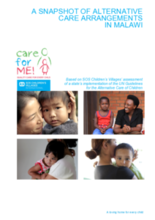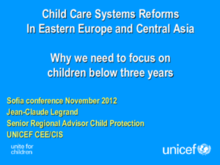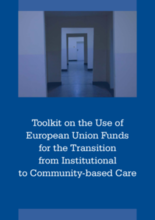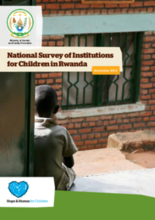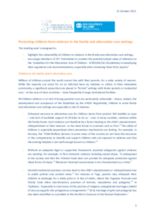Displaying 1241 - 1250 of 1482
The article reviews the historical development of out-of-home care in Italy and Spain and compares foster family and residential care, as well as the main research contributions to these topics in both countries.
This report and research conducted by SOS Children’s Villages reviews alternative care arrangements in Tanzania.
The ChildSafe network has produced important information for people who might be traveling abroad and can be confronted by situations where children are in distress or at risk of being abused or harmed, including through the practice of "orphan tourism".
This report from SOS Children’s Villages assesses Malawi’s compliance with, and implementation of, the UN Guidelines on the Alternative Care of Children.
This presentation to the 2012 Sofia Conference by Jean-Claude Legrand, Senior Regional Advisor Child Protection, UNICEF CEE/CIS, highlights the situation of children in formal care, with particular concern for children with disabilities, and recommends reform and policy initiatives to improve the childcare systems in Eastern Europe and Central Asia.
The purpose of the toolkit is to assist all public authorities in Europe involved in the programming and implementation of EU Structural Funds (and other relevant funds) to make decisions which will help to improve the lives of more than a million European citizens currently living in institutional care. The toolkit aims to explain how EU funds can support national, regional and local authorities in designing and implementing structural reforms to develop quality family-based and community-based alternatives. The toolkit explicitly deals with the European Social Fund (ESF) and the European Regional Development Fund (ERDF), but it aims to apply also to the programming and implementation of the European Agricultural and Rural Development Fund (EARDF) and the Instrument for Pre-accession Assistance (IPA).
Hope and Homes for Children, in partnership with the Ministry of Gender and Family Promotion (MIGEPROF), has conducted a national survey of all institutions for children in Rwanda to obtain an accurate picture of the current institutional system and the children living within it which can be used to inform decision-making regarding the implementation of the reform strategy and provide a baseline against which progress can be measured in the future.
This briefing note, produced by an Interagency Working Group on children without parental care, is designed to highlight the vulnerability of children to violence in the family and alternative care settings, and to encourage members of the CAT Committee to consider the potential added value of reference to the Guidelines for the Alternative Care of Children.
In this TED Talk, poet and playwright Lemn Sissay tells his story of growing up in foster care in the UK.
This paper aims to raise awareness on the perverse effects of institutionalisation on children and it calls for comprehensive system reforms, starting with a transition towards family and community-based care. It highlights country level lessons learnt in the European context that demonstrate how deinstitutionalisation can be achieved in practice.



